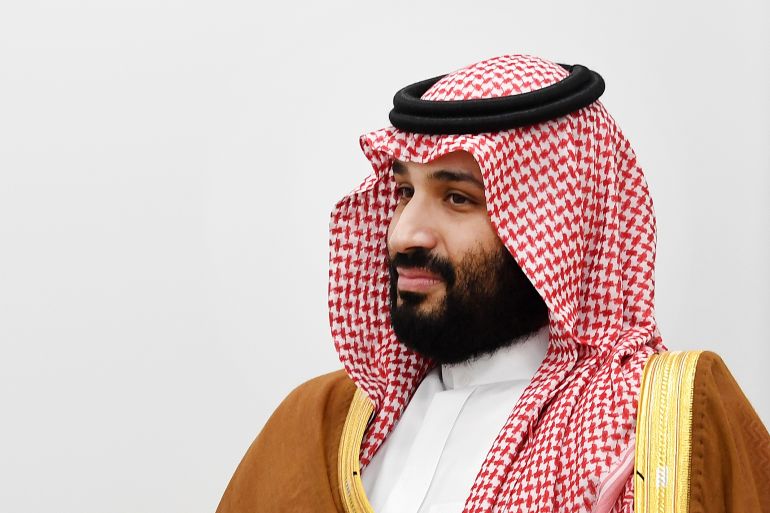Saudi crown prince ‘not attending Arab summit on doctors’ advice’
Algeria’s presidency says Prince Mohammed will not be attending the upcoming Arab League summit after his doctors advised him not to travel.

Saudi Arabia’s Crown Prince Mohammed bin Salman will not attend an upcoming Arab summit in Algeria in compliance with doctors’ recommendations to avoid travel, the Algerian presidency has said.
Saudi Arabia offered no immediate acknowledgement of the comments on Saturday by Algeria about the condition of Prince Mohammed, who has quickly risen to power under his 86-year-old father King Salman.
Keep reading
list of 4 itemsDo relations with Saudi Arabia still serve US interests?
Senior Hamas official released from Saudi Arabia, heads to Jordan
‘Troubled marriage’: Oil spat unlikely to break US-Saudi ties
Statements carried in Arabic and French on the Algeria Press Service late on Saturday referred to a statement from the office of President Abdelmadjid Tebboune about a telephone call between him and Prince Mohammed.
In the call, Prince Mohammed “apologised for not being able to participate in the Arab Summit to be held on November 1 in Algiers, in accordance with the recommendations of doctors who advise him not to travel”, the statement read.
“For his part, Mr President said he understood the situation and regretted the impediment of the Crown Prince, His Highness the Emir Mohammed Bin Salman, expressing his wishes for his health and well-being.”
A statement on the state-run Saudi Press Agency acknowledged a call between Tebboune and the prince but offered no word on the doctors’ advice. It just said the call focused on “the aspects of bilateral relations between the two fraternal countries” and possible joint cooperation.
The Arab League Summit in Algeria represents the first time the regional body has met since the COVID-19 pandemic took hold across the world.
The Arab League, founded in 1945, represents 22 nations across the Middle East and North Africa, though Syria has been suspended amid its long-running war. While unified in the call for the Palestinians to have an independent state, the body has otherwise been largely fractious and unable to enforce its mandates.
Prince Mohammed came to power in 2015 as deputy crown prince, then became crown prince some two years later after King Salman removed Prince Mohammed bin Nayef, a once-powerful figure as head of Saudi Arabia’s counterterrorism efforts and a close ally of the United States.
His rise to power has seen the kingdom undergo rapid changes, like allowing women to drive and opening movie theatres while loosening the grip of ultraconservatives. He also launched a purported corruption crackdown that targeted the richest men in the kingdom, and led an internationally criticised Arab coalition that staged a military campaign in Yemen.
US intelligence services linked Prince Mohammed to the 2018 killing and dismemberment of Washington Post columnist Jamal Khashoggi, a critic of the prince’s policies. The kingdom has denied the prince was involved, though its prosecution of the government squad behind Khashoggi’s slaying has been held behind closed doors.
Recently, the prince has come under intense US criticism over Saudi Arabia leading OPEC and allied nations to agree to an oil production cut of 2 million barrels per day.